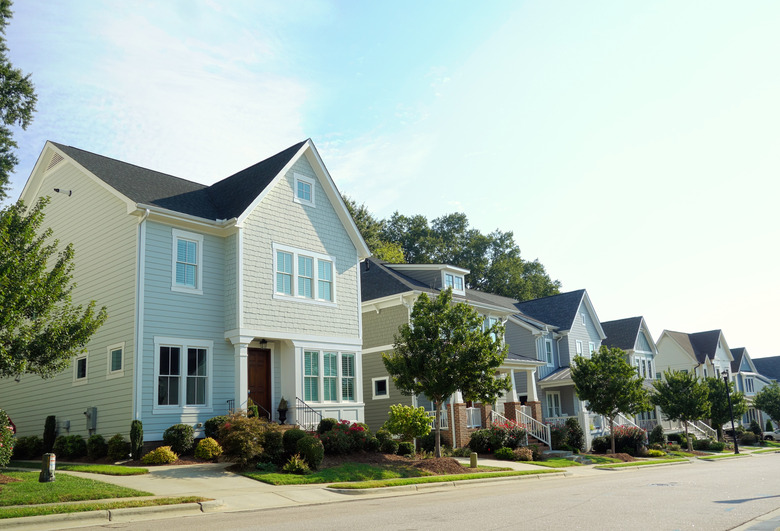What Exactly Does A Real Estate Market Crash Mean?
There was a major uptick in people googling "real estate market crash" in the month of September, with Google Trends reporting that searches had gone up an astounding 284 percent. This is the highest level in Trends' history, according to the pros, which raises questions about what people are hoping to find when they hit the search button.
Understanding the definition of a real estate market crash and what it means to the average homebuyer is obviously at the top of many people's minds. Here's what you need to know about the potential for a crash (and what it will mean for you).
Americans Want to Understand Housing Market Trends
According to an analysis completed by the Malibu real estate experts at RubyHome, Americans are looking for information and predictions about the U.S. housing market in record numbers. Part of the reason so many people are on the hunt for intel about the changing real estate market may have to do with the spike in interest rates — they are currently more than double what they were this time last year, jumping from 2.88 percent to 6.29 percent.
"The recent Federal Reserve interest rate hikes have led some consumers to believe a housing crash could be on the horizon," explains Tony Mariotti, CEO at RubyHome. "That's an understandable short-term reaction, but how the market plays out is still unfolding."
What Does a Real Estate Housing Crash Look Like?
In the broadest, most basic terms, Dawn Houlf, managing broker, SRES EXIT Realty Number One, says a housing crash would mean a massive lending downturn where there would be no available lending programs to speak of, and mortgage companies would be unable to fund any of the loans they have in process.
While this may sound dire to some, this isn't too far off from what many mortgage companies experienced in the 2008 subprime mortgage crisis, prompting several major lenders to shutter their doors forever. It doesn't seem too unreasonable that people are watching what is going on in the news (and on Wall Street) and starting to question whether they're watching history beginning to repeat itself.
Why Are People Worried Now?
Houlf believes that rising interest rates are what have people most worried about a housing crash right now. "With every percentage point that increases, the buyer loses between $10,000 to $20,000 in buying power," she explains, adding that buyers are now hoping housing prices will continue to decline so that borrowers will be better able to compensate for the loss of buying power.
It's understandable why some would have major concerns about interest rates doubling in such a short time, but Houlf is quick to point out that even though they are twice as high as they were a year ago, they're still nowhere near the maximums we have seen in the United States in the past. "The highest interest since 1954 was in 1981 at 16.63 percent," she said, adding that when she purchased her first home at the age of 18, rates were at 12.20 percent. This little anecdote shows just how much rates can change and how far we still have to go before we even come near those record highs.
A 2008-Style Housing Crash Isn’t Likely
While there are some people who may be crossing their fingers and rooting for a repeat of the early aughts housing downturn — like those who have been priced out of the housing market up until this point thanks to record-high home prices — Houlf doesn't believe we'll see the same things we saw back then. "The Fed has increased the interest rates with the hopes of slowing down the economy," she says, noting that homes have increased in price approximately 290.2 percent since the first quarter in 1991 to the second quarter of 2022.
While the Fed hopes to be able to slow the economy, it doesn't want to see it come to a grinding halt, which is why so many changes have been made in the world of real estate. Houlf notes that things like stronger lending criteria and more down payment programs to assist first-time homebuyers are among some of the more recent policy adjustments.
There Are People Who Will Benefit From the Housing Crash
Buyers may actually find themselves in a better position to land their dream home in the coming months or years. Houlf says that hopeful homeowners will have a bit more wiggle room when it comes to negotiations with sellers. "We are now in a buyers' market," she says, adding that things will finally more closely resemble a "normal market" instead of the super-heated version people have come to know since the start of the pandemic in 2020. "We are not there yet but working toward this."
There’s Still Some Confusion About What We’re Seeing
Many lending pros seem a bit hesitant to come right out and say we're in the middle of a crash because it could cause an already unsettled market to become further distressed, but Mariotti says there may not end up being a nationwide crash to speak of. "While a broad, moderate price correction is underway, a broad-based crash is unlikely, as inventory remains tight compared to pre-pandemic levels," he says, pointing out that some local markets could be in for a rougher ride than others.
"Some of the hottest markets during the pandemic have been the first to cool, and we've seen home prices decrease accordingly," he adds, noting that we saw the same kind of regionalized price action in 2008. Whether we're heading toward a full-blown crash or a series of localized "mini crashes" remains unknown for now, but one thing seems certain: Everyone wants to know what will come next in the world of real estate.
